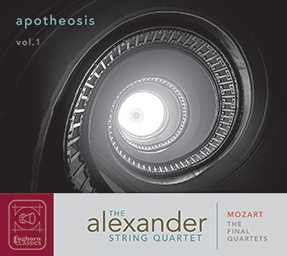apotheosis
(vol.1) mozart final quartets
ALEXANDER STRING QUARTET
FCL 2016
“There is a transparency in the playing and recording throughout this set which has a welcoming character that is both superficially attractive and always rewards ever-closer listening. This may have something to do with the matched quality of the instruments played here, all built by Francis Kuttner in 1987 and known as the Ellen M. Egger quartet of instruments… While the Alexander Quartet exudes enjoyable refinement and restrained poise there is also plenty of drama and excitement present. The final movement of K499 is bracingly vital, and the opening Allegretto of K575 has a wide-ranging and dynamic pungency. These quartets all have unexpected developments and sometimes stormy changes of character, and the Alexander Quartet players are all highly responsive to everything Mozart has in store for them. … I have very much enjoyed the Alexander Quartet’s deeply humane performances in this fine recording, and would recommend it wholeheartedly.” — Dominy Clements, MusicWeb International (April 2019)
Apotheosis, vol. 1, receives TOP RATING from InfoDad:
“The Alexander String Quartet’s approach to [the remaining works] is much the same ... pacing the works with care and balancing the parts so that the inner voices get considerable prominence — as is not always the case in readings of these works. The quartets are all characterized by changes of emotional tone between and sometimes within movements, and the performers handle those very well without ever losing sight of the cohesiveness of the music. The emotionalism of the final quartets, although certainly not “heart on sleeve” in the still-to-come Romantic manner, is an important element of their impact; and if there is a single touchstone for the Alexander String Quartet’s performances here, it is the performers’ willingness to engage the works’ emotional centers and devise some rather leisurely interpretations in terms of pacing for the sake of plumbing the inward focus of much of the music.”
— InfoDad (May 2019)
The booklet includes a Preface by violist Paul Yarbrough, excerpted here:
“Taken as a whole, Mozart’s works for string quartet, piano quartet, viola quintet, and clarinet quintet are a monumental accomplishment, as they codified the evolution of classical chamber music. He had taken Haydn’s brilliant efforts with the string quartet and elevated and broadened the genre, while adhering to Haydn’s formal and conversational precedent. But however much Mozart’s late chamber works conform, they are never ‘conformist.’ They still have the capacity to be stunningly original, and even, especially for the listeners of the time, shocking.”
Excerpt from the liner notes by Eric Bromberger:
“Mozart’s string quartets divide inconveniently into three groups. There are the juvenalia: the approximately sixteen divertimentos and quartets written between ages 14 and 17, many of these composed in response to Mozart’s youthful encounters with the string quartet as it was developing in Italy and Vienna. Then there are the mature quartets — sometimes referred to as “the ten great quartets” — and these divide into two distinct groups. First are the group of six quartets completed in Vienna between December 1782 and January 1785 and written in response to Mozart’s encounter with the six quartets of Haydn’s Opus 33 of 1781. Mozart described these quartets as “the fruit of long and laborious labor” and dedicated them to Haydn. And there are the final four quartets: the Quartet in D Major, K.499, known as the “Hoffmeister” Quartet, and the three so-called “King of Prussia” Quartets.
This division is inconvenient because the final four quartets make an awkward grouping. The “Hoffmeister” Quartet dates from the summer of 1786, when Mozart — then 30 years old and between the composition of The Marriage of Figaro and Don Giovanni — was at the height of his fame in Vienna. After composing the “Hoffmeister” Quartet, Mozart let the string quartet go for three years, and when he returned to the form in the spring of 1789 much had changed in his life and fortunes. His music had fallen out of favor in Vienna, his financial condition had become precarious, and he appears to have descended into a long depression and reassessment of his life and career. It is from out of this troubled period that he wrote his final three string quartets, and — over two centuries later — the conditions of their creation remain uncertain.
The four works on these discs are Mozart’s final string quartets, but the first of them comes from a very different world than the other three.
(Liner notes include discussion of each quartet, plus an introduction by violist Paul Yarbrough)
More Mozart:
Brahms & Mozart — Clarinet Quintets
Mozart Piano Quartets (Apotheosis vol. 2)
Mozart String Quintets (Apotheosis vol. 3)
Homage (”Haydn Quartets”)
Order Now
ORDER NOW
• • •
TWO-CD SET INCLUDES:
DISC 1
String Quartet in D Major, K. 499, “Hoffmeister”
String Quartet in D Major, K. 575, “Prussian”
DISC 2
String Quartet in B-flat Major, K. 589, “Prussian”
String Quartet in F Major, K. 590, “Prussian”
